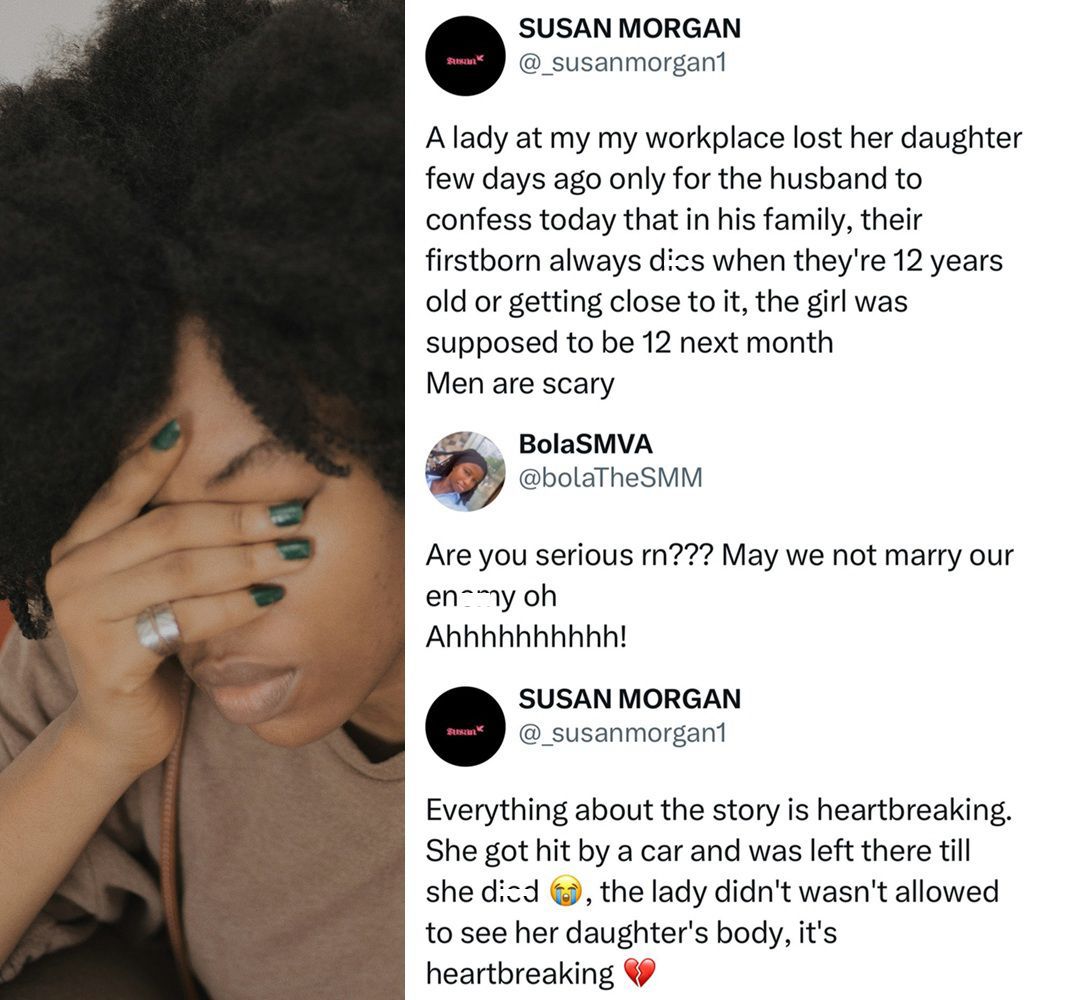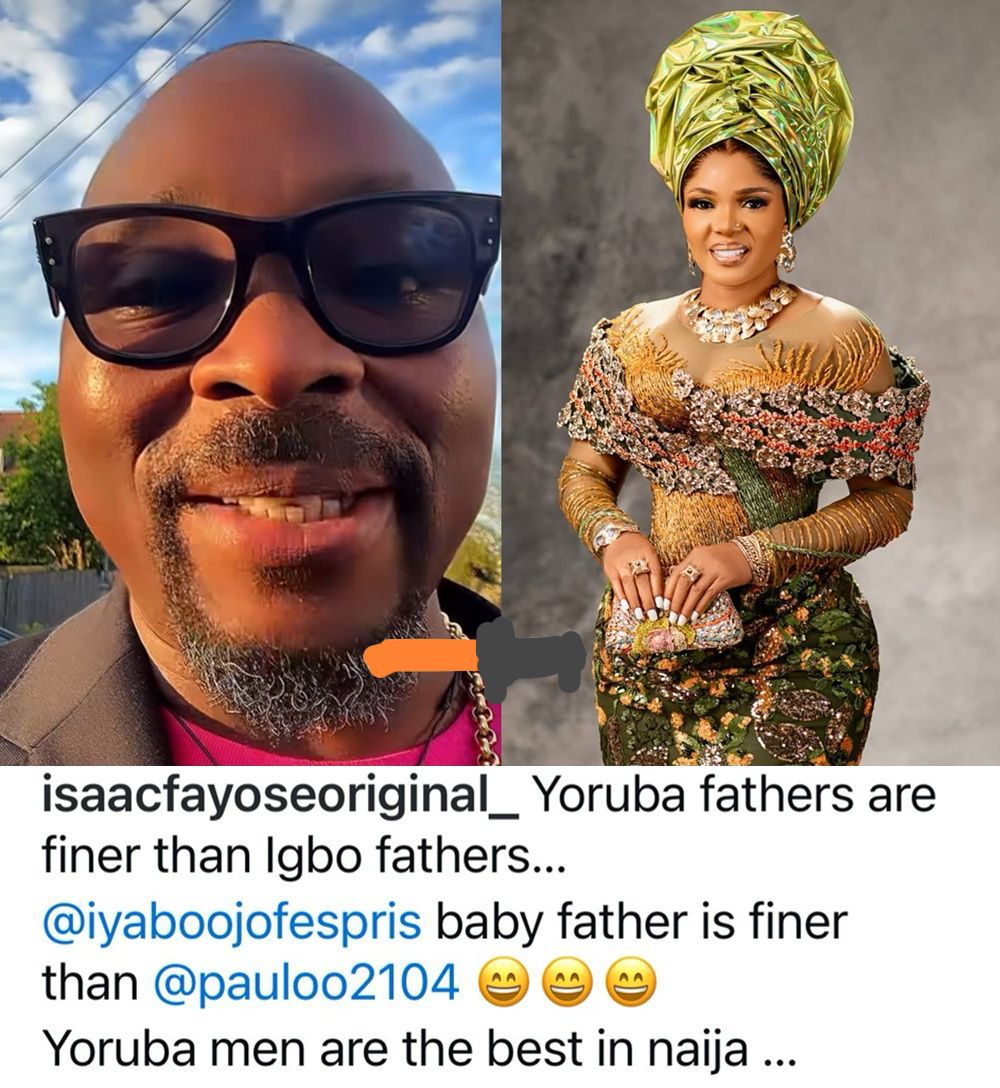
“She Was Supposed to Turn 12 Next Month” – Woman Shares Heartbreaking Story of Colleague’s Daughter and the Dark Family Secret That Followed

A harrowing story has emerged on social media that has left many Nigerians shocked, heartbroken, and reeling from the chilling details. In a series of emotional tweets, a woman identified as Susan Morgan (@_susanmorgan1) shared the tragic loss of her colleague’s 11-year-old daughter, a devastating event made even more disturbing by a dark family confession that followed.
According to Susan, the young girl, who was due to celebrate her 12th birthday next month, tragically died after being hit by a car. What initially seemed like a heartbreaking accident quickly unraveled into something more sinister and deeply unsettling. In a shocking twist, the child’s father reportedly confessed that in his family, the firstborn child always dies at or just before the age of 12—a revelation that has left both the bereaved mother and the public horrified.
“A lady at my workplace lost her daughter a few days ago, only for the husband to confess today that in his family, their firstborn always dies when they're 12 years old or getting close to it,” Susan tweeted, her disbelief clear. “The girl was supposed to be 12 next month. Men are scary.”
The revelation has sent shockwaves across social media, with many users reacting in disbelief, horror, and outrage. Comments poured in, with users like @bolaTheSMM expressing what many were feeling: “Are you serious rn??? May we not marry our enemy oh. Ahhhhhhhhhh!” The disbelief is understandable—how could a man knowingly carry such a burden, such a generational pattern, and yet keep it hidden from the woman who bore his child?
Adding to the weight of the tragedy, Susan shared that the young girl, after being struck by a vehicle, was left unattended at the scene and died alone. The mother, who was already shattered by the news of her daughter’s passing, was reportedly not even allowed to see her child’s body. “Everything about the story is heartbreaking,” Susan wrote. “She got hit by a car and was left there till she died. The lady wasn’t allowed to see her daughter’s body. It’s heartbreaking.”
The layers of this story are almost too heavy to comprehend—the grief of a mother who lost her only child in such a cruel, senseless way, compounded by the weight of a secret she never should have had to discover after the fact. It’s not just a story about loss; it’s a story about betrayal, silence, and the terrifying consequences of secrecy within families.
For many, the most chilling part isn’t just the idea of a generational curse or pattern—it’s the father’s decision to never disclose it. Questions have erupted online. Why did he keep this from his wife? Had he accepted this as an unchangeable fate? Could something have been done to prevent it? And if he believed it to be true, why bring an innocent child into the world without full disclosure?
The silence, in this case, speaks volumes. The idea that a parent could live with the knowledge that their child might not survive past a certain age, and yet not fight with everything in them to break that cycle or at least warn the other parent, is what has left many outraged. The comments section under Susan’s thread has turned into a virtual town square, filled with grief, confusion, and fury.
“This isn’t just wicked, it’s evil,” one user wrote. “He should have said something. Anything. That little girl deserved more.”
“This is beyond scary,” another added. “What kind of human being knows that and says nothing? That poor child didn’t even stand a chance.”
Amid the grief and the anger, a deeper conversation is beginning to surface—one that questions how often secrets are kept in families, and how those secrets, buried in silence, end up haunting generations. The idea of generational curses may seem distant or superstitious to some, but in many African cultures, these narratives still hold weight. Whether symbolic or spiritual, the effects of unspoken legacies—of trauma, of misfortune, of loss—can manifest in deeply painful ways when they are not addressed.
And while the supernatural undertones of the story are impossible to ignore, what has resonated with many is the sheer human tragedy of it all: a mother robbed of her daughter, a little girl robbed of a life she hadn’t even started, and a secret that came to light only when it was far too late.
In the aftermath, one cannot help but think of the mother—this colleague of Susan’s—who now must wake up every day with an ache in her chest and a thousand unanswered questions. The kind of pain that doesn’t just settle in the heart but makes a home in the bones. The kind of loss that will echo in her every breath.
Social media has, as expected, become the outlet for collective mourning, for rage, and for questions that may never be answered. Some have offered prayers, others words of comfort, and many have simply sat in the shared silence of shock.
“May we never marry our enemy,” the phrase that echoed most from the comments, now feels like more than a reaction—it feels like a plea. A plea for transparency, for truth, for partnership built on honesty and protection. A plea to know the full history of the people we love, so that we never unknowingly walk into battles we didn’t prepare for.
This story is not just a viral moment—it’s a mirror, reflecting the pain of silence and the price of secrets. As more people react, share, and reflect, one can only hope that this tragedy sparks deeper conversations about openness in relationships, the legacies we carry, and the urgent need to protect children at all costs—both physically and spiritually.
Because no mother should have to bury her child under the shadow of a truth she was never told. And no child should ever be fated to die without even knowing why.


